
In this update:
- Special Session
- Legislative Updates
- Agency Updates
- Election Updates
Special Session
Workforce special session bill referred to committee, GOP vows to propose plan of its own
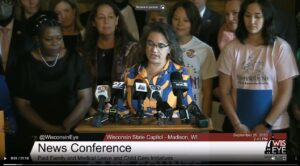
The special session called by Governor Tony Evers (D) to address workforce development was adjourned by the Legislature without taking action on the floor. Instead, the special session bill was referred to the Senate Economic Development and Technical Colleges Committee. Committee Chair Dan Feyen (R) said in a statement that “Some of the issues included in this special session bill need to be addressed sooner rather than later to keep the Wisconsin economy on track.” Senator Feyen also said he looks “forward to holding a public hearing and gathering input from the people of Wisconsin as we focus this legislation to have the greatest impact possible.”
Gov. Evers had initially proposed investing more than $1 billion to address the state’s workforce issues, including $365 million for childcare subsidies, $243.4 million for a paid family leave program, and $66 million for the UW System. However, Republicans dismissed the proposal as a “wish list.” Senate Majority Leader Devin LeMahieu (R) said that Gov. Evers “has been a roadblock to getting Wisconsin back to work,” by opposing additional work search requirements for welfare recipients. Republicans also pointed to the package of childcare bills they passed as evidence of their commitment to addressing the workforce development. “The Assembly just last week passed multiple measures including … passing the Choices in Childcare package,” Majority Leader Tyler August (R) said. “The Assembly is focused on improving child care access across the state, while also making child care more affordable.”
Responding to the legislature adjourning, Gov. Evers said he was “not surprised” Republicans rejected his proposal. “If they cared about workforce, they would have done exactly what I asked them to do, because there are going to be child care organizations across the state that are going to go belly up,” Gov. Evers said. “For every child that loses child care, that’s one person that’s going to be out of the workforce.” Democratic lawmakers also held a press conference where they promised to introduce separate legislation that would appropriate $304 million to continue funding the Childcare Counts Program. “It is unconscionable that Republicans continue to ignore the needs of our youngest residents of the families and workers and employers throughout our state,” Sen. Kelda Roys (D) said.
Legislative Updates
Resolution seeking to impeach Meagan Wolfe introduced in Assembly
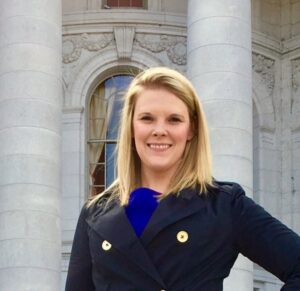 Five GOP members of the Assembly introduced a resolution to impeach Wisconsin Elections Commission (WEC) Administrator Meagan Wolfe. The authors of the resolution include Rep. Janel Brandtjen, Rep. Scott Allen, Rep. Elijah Behnke, Rep. Ty Bodden, and Rep. Chuck Wichgers. The resolution follows a 22-11 party-line vote in the Senate to remove Ms. Wolfe as WEC administrator. Democrats have disputed the validity of the confirmation vote with Democratic Attorney General Josh Kaul filing a lawsuit shortly after the vote asking for the courts to clarify whether Ms. Wolfe remains a lawful holdover.
Five GOP members of the Assembly introduced a resolution to impeach Wisconsin Elections Commission (WEC) Administrator Meagan Wolfe. The authors of the resolution include Rep. Janel Brandtjen, Rep. Scott Allen, Rep. Elijah Behnke, Rep. Ty Bodden, and Rep. Chuck Wichgers. The resolution follows a 22-11 party-line vote in the Senate to remove Ms. Wolfe as WEC administrator. Democrats have disputed the validity of the confirmation vote with Democratic Attorney General Josh Kaul filing a lawsuit shortly after the vote asking for the courts to clarify whether Ms. Wolfe remains a lawful holdover.
In the co-sponsorship memo calling for impeachment, the GOP authors of the resolution say Ms. Wolfe’s “impeachment is warranted due to her maladministration during her tenure as the Administrator of the Wisconsin Elections Commission.” The memo claims the proposed impeachment would “save taxpayer funds and reaffirm the legislature’s authority to remove an administrator who has failed to adhere to existing statutes.” The resolution outlines 15 grounds for impeaching Ms. Wolfe.
Democrats were quick to dismiss the impeachment resolution, with Senate Minority Leader Melissa Agard (D) calling the move “A gaggle of well-known election deniers once again attacking … a nonpartisan election administrator who has served Wisconsin and our democracy with the utmost respect and dignity.” Assembly Minority Leader Greta Neubauer agreed, saying “Legislative Republicans are completely out of control,” and are “clearly willing to sink to incredible lows to cement their power and undermine the will of the people.”
Neither Assembly Speaker Robin Vos (R) or Senate Majority Leader Devin LeMahieu (R) have weighed in yet on the impeachment resolution. For the resolution to move forward, Speaker Vos would first have to assign the impeachment articles to a committee. Impeaching and removing Ms. Wolfe would require a simply majority vote in the Assembly, where Republicans currently outnumber Democrats 64-35, and a two-thirds majority vote in the Senate, where Republicans have a 22-11 majority.
GOP pitches new funding plan for Brewers stadium
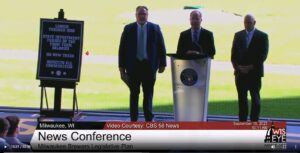
Assembly Speaker Robin Vos (R), Representative Rob Brooks (R), and Senator Dan Feyen (R) announced a new funding plan for the Brewers stadium at American Family Field. According to a memo from the Legislative Fiscal Bureau (LFB), the new bill allocates $411 million of state funding, $202.5 million of local funding, and $100 million of funding from the team to keep the Brewers in Milwaukee until 2050. Annually, the city and county would contribute approximately $7.5 million for the next 27 years. Rep. Brooks said local officials had been offered the opportunity to create a plan where the county and city would only have to contribute $5 million annually, but they had not delivered a plan prior to the bill’s release.
The GOP legislators stressed their proposed investment in the stadium would cost the state less than it would if the team moved to another city. They also highlighted the use of state and local taxes from MLB salaries to help fund the state’s portion of the deal. LFB reported the state received $12.4 million of withholding taxes from MLB-related personnel in 2022, and with a 4% annual growth rate, the tax withholdings would be $37.1 million in 2050. However, LFB also noted that number could decrease if the Legislature were to enact “significant reductions to the income tax over the following 27 years.” According to Speaker Vos, the latest plan would also winterize the stadium at a cost of around $25 million, which would allow it to host events year-round and generate more revenue. Under the current plan, LFB projected $1.3 million in revenue for Milwaukee County and $3.5 million for the city in 2024.
Senate Minority Leader Melissa Agard (D) and Assembly Minority Leader Greta Neubauer (D) both said they are willing to negotiate a bipartisan deal to keep the Brewers in Milwaukee, but the current plan “falls short” because it places “too great of a financial burden on the city and county of Milwaukee.” Sen. LaTonya Johnson (D) said the deal is bad for the city and county and questioned how either would be able to afford to pay the share allotted to them in the proposal. Members of the city’s common council expressed similar concerns. Milwaukee Mayor Cavalier Johnson said the proposal amounts to “taxation without representation” because neither the city or county would have a seat on the Southeast Wisconsin Professional Baseball Park District, the board that technically owns and operates the stadium. Senator Tim Carpenter (D) and Senator Rob Cowles (R) both requested the Legislative Audit Bureau review the stadium board’s finances before any final decisions are made on the funding plan.
The GOP plan comes after Governor Tony Evers (D) had originally proposed in his FY 2023-25 budget to spend $290 million from the state’s surplus to pay for stadium repairs and keep the Brewers in Milwaukee until 2043. However, Republican legislators opposed that plan because they wanted the team to stay in Milwaukee longer and not rely as heavily on one-time money from the budget surplus. A spokesperson for Gov. Evers said the governor was disappointed the GOP had rejected his “commonsense proposal,” but that he “looks forward to reviewing Republicans’ proposal and continuing conversations on a plan that provides additional flexibility and minimizes harm for local partners while ensuring we keep this important economic driver and thousands of jobs in our state.”
Vos vows to block UW System pay raises
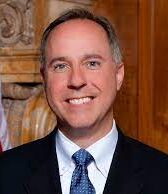 During an interview last week with WisPolitics, Speaker Robin Vos (R) said he would block UW System pay raises unless UW first cuts its diversity, equity, and inclusion (DEI) positions. UW employees had been set to receive pay hikes of 4% in the first year of the budget and 2% in the second year. Before taking effect, the pay raises must be approved by the GOP-controlled Joint Committee on Employment Relations, of which Speaker Vos is the committee’s co-chair. During the interview, Speaker Vos said “I don’t think that they deserve to have any more resources until they [eliminate the DEI positions].” “Not a nickel,” Speaker Vos clarified. “When I say a nickel, that’s what I mean.” Responding to Speaker Vos’ comments and seeking to tie the issue of DEI to recruiting and retaining top talent in the state’s workforce, a spokesperson for Gov. Evers said “Republicans are more focused on playing political games with Wisconsinites’ livelihoods, continuing their decade-long war on higher education, and making it harder to recruit and retain talented workers than finding real solutions to our state’s shrinking labor force.”
During an interview last week with WisPolitics, Speaker Robin Vos (R) said he would block UW System pay raises unless UW first cuts its diversity, equity, and inclusion (DEI) positions. UW employees had been set to receive pay hikes of 4% in the first year of the budget and 2% in the second year. Before taking effect, the pay raises must be approved by the GOP-controlled Joint Committee on Employment Relations, of which Speaker Vos is the committee’s co-chair. During the interview, Speaker Vos said “I don’t think that they deserve to have any more resources until they [eliminate the DEI positions].” “Not a nickel,” Speaker Vos clarified. “When I say a nickel, that’s what I mean.” Responding to Speaker Vos’ comments and seeking to tie the issue of DEI to recruiting and retaining top talent in the state’s workforce, a spokesperson for Gov. Evers said “Republicans are more focused on playing political games with Wisconsinites’ livelihoods, continuing their decade-long war on higher education, and making it harder to recruit and retain talented workers than finding real solutions to our state’s shrinking labor force.”
The disagreement over UW’s DEI positions emerged during the FY 2023-25 budget process when Republican legislators cut $32 million and 188.8 positions related to DEI from the UW-System budget. Gov. Evers then used his partial veto to keep the DEI positions in place. However, the $32 million was put in a supplemental fund that Republican lawmakers said could be recovered by the UW-System if it proposes a plan to spend the money to bolster the state’s workforce. UW System’s Vice President of Finance and Administration Sean Nelson told the board of regents in August the system planned to ask the Legislature to release $15 million this fall. However, Republicans have said no money will be released until the DEI positions are eliminated.
Agency Updates
Underly delivers state of education address
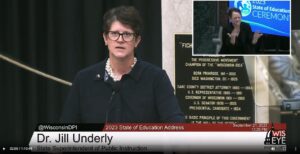
Department of Public Instruction (DPI) Superintendent Jill Underly delivered the 2023 State of Education Address this week at the Wisconsin State Capitol. Key issues broached by Dr. Underly included:
Having hope in times of division and uncertainty
- Underly Compared the current political climate in public education to the story of “The Very Hungry Caterpillar”.
- “There is, I know, a lot of mess,” Dr. Underly said. “We’re through a global pandemic. We’re seeing mental health challenges that have been mounting for too long turn into a burgeoning crisis. There is so much division and hate, because it’s easy to stoke fear in times of shifting and uncertainty and change … Tearing something down is always easier than building it. And yet, sometimes what is hard can also be what is hopeful.”
- Underly pointed to the recently-passed bipartisan reading bill as an example of how something good can come out of a messy process. “This is an example of how we can work together to advance good policy and good research to help kids, and to help the future be brighter for all kids, and in turn, all of us,” Dr. Underly said.
Promoting Diversity, Education, and Inclusion
- Underly stressed the importance of diversity, equity, and inclusion (DEI) initiatives in education.
- “This is a good moment to remember that curriculum which reflects the diversity of the human struggle and progress is, in fact, reflective of the history of this country, and that affirming that the lives of our Black, Indigenous and students of color matter is not political. It is a statement of fact,” Dr. Underly said. “Also, it bears remembering that safety is a requisite for every kid, and creating safety for LGBTQ+ kids is not controversial. It is the bare minimum.”
Republican Response
Senate Education Committee Chair John Jagler (R) delivered the GOP’s response to Dr. Underly’s address. Pointing to a package of bills recently introduced that would phase out parental choice programs and raise state reimbursement rates for special education, Sen. Jagler said “Unfortunately, our educational progress is under attack from the educational establishment, their allies, and legislative Democrats.” Sen. Jagler said Republicans will continue pushing for more school choice options because public schools continue to teach curriculums that parents don’t want. “Simply put, for many in my generation, the academics they saw their children engaged in was radically different than our own education; the basics seemingly disappeared,” he said. “Because of this, our choice programs and waiting lists to get into them our growing, and the waiting lists for them are growing, too…not because of what we’ve done in the Capitol, but because parents are demanding it,” Sen. Jagler said.
DPI moves forward with website that would disclose school spending
The Department of Public Instruction announced Tuesday it is moving forward with creating a website that will disclose school spending details. The website had been put on hold after the agency received an anonymous objection last month from a member of the Joint Finance Committee (JFC) who objected to including private schools in the DPI dashboard. However, that objection has now been dropped, and no additional objections have been raised.
The initial objection was raised after the Wisconsin Coalition for Education Freedom (WCEF) sent a letter to JFC members in August alleging DPI had incorrectly sought to include information about private school expenses and revenues in the dashboard. In a statement this week, WCEF said it worked with JFC to ensure DPI’s new website met legislative intent and included additional information about revenues and student counts for parental choice, charter, and open enrollment programs. Members of WCEF include School Choice Wisconsin, the Wisconsin Institute for Law & Liberty, and Wisconsin Manufacturers & Commerce.
DPI spokesperson Chris Bucher said only small changes have been made to the initial website proposal from DPI such as adding information to a revenue chart for independent charter school deductions and open enrollment. According to the plan presented by DPI, the dashboard would feature financial data DPI receives from school districts, county children with disabilities education boards, and independent charter schools. The dashboard would also include data on how much available revenue is spent on non-public school students, how much of school district participants’ tax levy goes toward private voucher and independent charter schools, and how much aid toward public school students is reduced.
Election Updates
Milwaukee Mayor Cavalier Johnson running for reelection
 Milwaukee Mayor Cavalier Johnson announced his bid for reelection this week. No other candidates have yet announced their intention to challenge the first-term mayor. Mayor Johnson won an abbreviated term in 2022 after former Mayor Tom Barrett was chosen as ambassador to Luxembourg. Since becoming the city’s top executive, Mayor Johnson successfully advocated for increased state aid for the city, as well as getting approval from the legislature and city council to implement a 2% local sales tax.
Milwaukee Mayor Cavalier Johnson announced his bid for reelection this week. No other candidates have yet announced their intention to challenge the first-term mayor. Mayor Johnson won an abbreviated term in 2022 after former Mayor Tom Barrett was chosen as ambassador to Luxembourg. Since becoming the city’s top executive, Mayor Johnson successfully advocated for increased state aid for the city, as well as getting approval from the legislature and city council to implement a 2% local sales tax.
In his second term, Mayor Johnson said his focus would be on public safety and economic development. He pointed to protected bike paths and a pedestrian plaza as improvements that would create new jobs and improve neighborhoods in the city. Mayor Johnson also said that he wants to work with Republicans in the legislature to make sure criminals, felons and domestic abusers are not able to obtain guns.
The election will be held April 2, 2024. A primary election would be held February 20 if more than two candidates enter the race.



